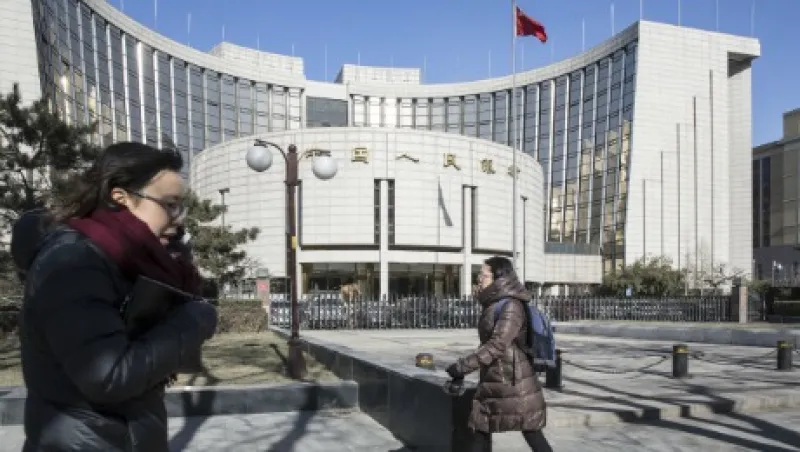Global financial markets have been right to focus on China in recent months. Slower growth and a rebalancing economy against a backdrop of high — and not always transparent — levels of corporate debt will have profound implications for the global economy. The most salient risks, however, have less to do with the odds of an acute domestic financial crisis and collapse — which are low — but instead have more to do with the resulting global financial spillovers, which are more consequential and yet broadly underappreciated.
Despite the slowdown and worrisome levels of private sector debt, the probability of a domestic financial crisis in China — or of panic-induced capital flight that forces a collapse in the value of the renminbi — remains very low, in our view at Eurasia Group. With 95 percent of corporate debt in local currency, and financial stability a top priority for China’s leaders, policymakers have the desire and the ability to keep domestic financial conditions from tightening, which they will achieve through rate cuts, reductions in reserve requirements and perhaps, if needed, unconventional credit policies.
At the same time, a significant portion of China’s reserve drawdown in 2015 was driven by Chinese corporations and banks covering short dollar positions. This factor suggests both that the risks to China of a weaker renminbi have receded and that depreciation pressure on the renminbi will largely be a function of capital account pressure that results from domestic monetary expansion. In our view, these pressures will be partially offset by a combination of reserve drawdown, ad hoc capital controls, large trade surpluses and interest rate and exchange rate reactions in the rest of the world as other nations respond to imported disinflation from China.
Whereas the risks of China’s sparking a global financial crisis are low, the spillovers from such a policy course — through both real economic and financial channels — will be large and consequential. A weaker renminbi and the structural shift in China’s growth trajectory away from fixed-asset investment will add to pressures on the world’s commodity and oil exporters, from Brazil to Australia and to South Africa and the Middle East. But given the size and the prowess of China’s tradable sector, a weaker renminbi will also pressure China’s trading competitors, including those in Asia — especially Japan and South Korea — Germany and the rest of Northern Europe. Meanwhile, even a moderately weaker renminbi that results just from the interactions described above may even play into U.S. domestic politics.
But politics is not just an issue in the U.S. Throughout the world, past and future interactions of politics, policy and capacity will play a vital role in determining the ability of countries to navigate the challenges described above. Emerging markets, especially those that are primarily commodity producers, will bear the brunt of the pain. Many of these countries face a stagflationary mix of a negative terms of trade shock, a downturn in future trend growth as commodity investment plummets and high-inflation pass-through from a weaker exchange rate. It is important to note, however, that the degree of vulnerability by itself is determined by the legacy of past policy choices and current political capacity.
For example, even within the ranks of emerging-markets oil producers, the impact of these shocks is very different. Mexico, Malaysia, Russia and Nigeria all have experienced a massive terms of trade shock as a result of the drop in oil prices, leading in turn to severe depreciation pressures on their currencies. In Mexico and Malaysia, currency depreciation has had relatively little impact on inflation or on inflation expectations, giving the central bank room to keep from having to hike rates substantially in the middle of a growth slowdown. Past policy measures that pursued integration into global production chains have also provided these countries with sizable noncommodity manufacturing sectors that should be able to benefit from the competitiveness gains of a weaker currency. With higher-inflation pass-through and a more oil-dependent export mix, Russia lacks these advantages, but the dominance of President Vladimir Putin has allowed him to push through substantial adjustments in real government spending, even as inflation has risen with a weaker ruble. Essentially, Putin’s 85 percent approval rating — which stems in part from foreign policy adventurism — have allowed him to push through a huge current-account adjustment in the face of an oil shock by compressing domestic real incomes. Finally, in the case of Nigeria, persistent issues of governance and logistics have contributed to an undifferentiated export mix, inflation expectations could be severely compromised by a change in currency regime, and recently installed President Muhammadu Buhari has pushed for both fiscal and monetary easing to deal with growth slowdown. The result is heterodox policy confusion.
These issues are not just limited to the commodity exporters. Even among commodity importers that should be beneficiaries of the shift in relative prices following the shale revolution and the change in China’s growth dynamics, differences in technocratic capacity and independence have been a factor behind the favorable market perceptions of India versus, for example, those of Turkey. A consumption-driven model of growth — and a concurrent erosion of institutional independence at the central bank and Finance Ministry — is seen as inherent to President Recep Tayyip Erdogan’s own political ambitions, whereas in India, Prime Minister Narendra Modi and Reserve Bank of India governor Raghuram Rajan work together to encourage investment and eliminate structural bottlenecks as part of a (much) longer-term plan to make India more attractive to global capital, just as China slows.
Beyond these examples, we see politics and policy as fundamental backdrops that condition country-level vulnerability and resiliency. We see politics not as a force that influences economic outcomes and asset markets intermittently but, rather, as an essential attribute that determines them. Political constraints influence policy choices, which in turn determine the capacity of the state to manage shocks.
We have looked at how correlated asset price performance is with measured levels of political stability and capacity and have found reasonable levels of correlation between stability and performance in equities, bonds and currencies in recent months. We also focus our research on the relationship between institutional fundamentals and the ability of emerging markets to carry out countercyclical policies. Can they use stimulative monetary and fiscal policies when growth is slowing? Often, the currency depreciation typically associated with growth slowdowns in emerging markets leads domestic financial conditions to tighten because of foreign currency debt, high-inflation pass-through and weak, less credible institutions. These all constrain policymakers’ freedom.
In seeking to understand what determines the ability of some emerging markets to break the link between currencies and domestic interest rates, we find that surplus countries have a much greater ability to carry out countercyclical responses. As noted above, in the Russian instance, politics can be a key driver of current-account performance in the face of a terms of trade shock. More interestingly, among the ranks of countries running heavy current-account deficits, political institutions appear to play an important role. Places with stronger institutions, such as Chile, Mexico and Poland, for example, have more space for credible countercyclical policy, whereas places with less strong or weakening institutions — think Turkey and South Africa — face more constraints. As the world wrestles with the broader economic and financial implications of the epochal changes in China, we believe that research making political capacity an integral part of the assessment process is going to be an indispensable element of outperformance.
Alexander Kazan is head of emerging-markets strategy, and Karthik Sankaran is director of global strategy, both at Eurasia Group in New York.






